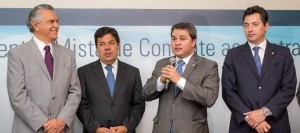Congress creates parliamentary front to combat smuggling

Brazil needs to do more to win the war on smuggling, and the path is through the creation of tougher laws and the collection of more effective actions by the public authorities. That was the reason that led 202 federal deputies and 23 senators to create the Mixed Parliamentary Front to Combat Smuggling and Counterfeiting, officially established on May 14, in the National Congress, in Brasilia.
The ceremony was attended by parliamentarians and representatives of the executive, public prosecutors, judiciary and more than 50 civil society associations, such as the Movement for the Defense of the Brazilian Legal Market, created in September 2014 and led by the ETCO-Institute Brazilian Competition Ethics Committee and the FNPC-National Forum Against Piracy and Illegality.
The parliamentary front is chaired by federal deputy Efraim Filho (DEM / PB), one of the parliamentarians most dedicated to combating smuggling. He was the author, for example, of the project approved in 2014 that modified the penal code and increased the penalties for this crime, which used to range from one to four years, to two to five years. According to the deputy, the front will focus on four lines of action: 1) Drafting bills against counterfeiting and smuggling; 2) Charge governmental actions at the federal, state and municipal levels to combat these crimes; 3) Hold debates and public hearings to involve the whole of society in discussing the problem; and 4) Study and implement other initiatives to reduce smuggling.
Loss of driver's license and CNPJ
As a first act, deputy Efraim Filho filed with the Chamber of Deputies the Bill 1530/15, which toughens penalties for crime. The proposal provides for three new mechanisms to curb smuggling. The first is the loss of a driver's license for anyone caught in the act carrying smuggled goods. The fear of suffering this punishment should reduce the supply of drivers willing to take risks in driving vehicles with illegal products.
The second is the cassation for five years of the CNPJ of companies condemned for transporting, distributing, storing or selling contraband products. The third mechanism seeks to encourage complaints against the illegal trade in these goods. It makes it mandatory to display cigarettes and beverages at a visible location with a sign with the following warning: “It is a crime to sell contraband cigarettes and beverages. Report it".
The president of the front intends to demand more efforts from the governments in the inspection of the borders. “It is necessary to understand that investing resources in the fight against smuggling is not a cost, but an investment,” said Efraim Filho, citing the example of Operation Ágata, carried out in 2011. “It is estimated that R $ 10 million were spent and it was possible to collect in return more than R $ 300 million. ”
Senator Ronaldo Caiado (DEM-GO), vice president of the Parliamentary Front, defended the toughening of the punishment for those who receive contraband products. "The penalty for the recipient must be four times greater than that of someone who smuggles," he said. "I believe that, in the short term, we will present a result against something that is destroying the country."
It is estimated that Brazil loses about R $ 100 billion each year due to smuggling, with negative impacts on tax collection, job losses, unfair competition with companies that comply with legal obligations, health risks of population and increased crime.



